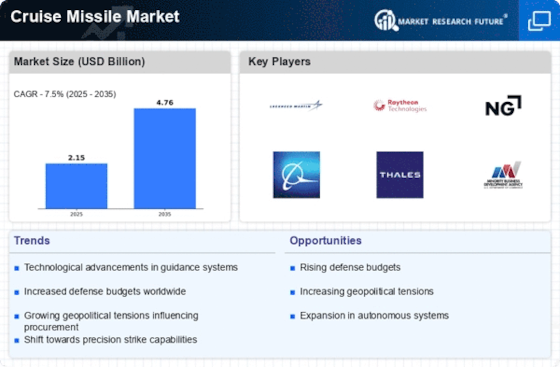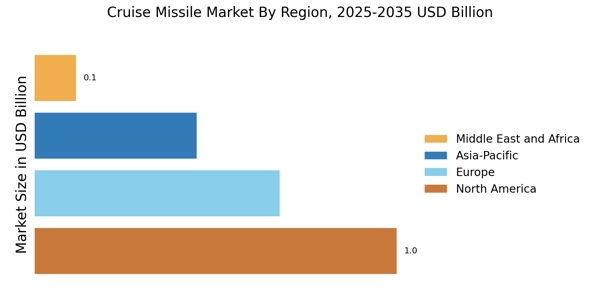Emerging Markets
Emerging markets are becoming increasingly important players in the cruise missile Market. Countries in regions such as Asia and the Middle East are investing heavily in their defense sectors, recognizing the strategic importance of cruise missiles in modern warfare. These nations are not only acquiring existing technologies but are also developing indigenous missile programs to enhance their self-reliance. The rise of these emerging markets is expected to contribute to a diversification of the global cruise missile landscape. As these countries seek to establish themselves as regional powers, the demand for advanced missile systems is likely to grow. This trend suggests that the Cruise Missile Market will experience a shift in dynamics, with new players entering the market and challenging established defense contractors. The potential for collaboration and technology transfer between nations further enhances the prospects for growth in this sector.
Geopolitical Dynamics
Geopolitical dynamics play a crucial role in shaping the Cruise Missile Market. Heightened tensions between nations often lead to increased military spending, particularly in missile technology. Countries are focusing on enhancing their defense capabilities in response to perceived threats, which drives demand for advanced cruise missiles. For example, recent military exercises and strategic alliances have underscored the importance of missile systems in national defense strategies. The market is expected to witness a significant uptick as nations prioritize the acquisition of sophisticated cruise missiles to maintain a strategic edge. Furthermore, the ongoing conflicts in various regions have prompted governments to reassess their military strategies, leading to an increased emphasis on precision strike capabilities. This trend suggests that the Cruise Missile Market will continue to expand as nations seek to bolster their deterrence and offensive capabilities.
Defense Budget Increases
In recent years, many countries have increased their defense budgets, which has a direct impact on the Cruise Missile Market. This trend is particularly evident in nations that perceive a need to modernize their military capabilities in light of evolving threats. For instance, defense spending in several regions has risen by an average of 3-5% annually, with a significant portion allocated to missile development and procurement. This increase in funding allows for the research and development of advanced cruise missile systems, which are essential for maintaining national security. As countries prioritize their military expenditures, the Cruise Missile Market is likely to benefit from this influx of capital, leading to enhanced production capabilities and technological innovations. The focus on developing multi-role cruise missiles that can perform various missions further indicates a robust growth trajectory for the industry.
Technological Advancements
The Cruise Missile Market is experiencing rapid technological advancements that enhance missile capabilities. Innovations in guidance systems, propulsion technologies, and stealth features are driving the development of more precise and effective cruise missiles. For instance, the integration of artificial intelligence and machine learning into missile systems is expected to improve targeting accuracy and decision-making processes. According to recent data, the market for advanced cruise missiles is projected to grow at a compound annual growth rate of approximately 5.2% over the next five years. This growth is largely attributed to the increasing demand for high-tech military solutions that can operate in contested environments. As nations invest in modernizing their arsenals, the Cruise Missile Market is likely to see a surge in research and development activities aimed at creating next-generation systems.
Increased Focus on Precision Warfare
The increased focus on precision warfare is reshaping the Cruise Missile Market. As military strategies evolve, there is a growing emphasis on minimizing collateral damage while achieving strategic objectives. This shift is driving demand for precision-guided munitions, including advanced cruise missiles that can strike targets with high accuracy. Recent studies indicate that the market for precision-guided munitions is expected to grow significantly, with cruise missiles playing a pivotal role in this trend. The ability to conduct surgical strikes with minimal risk to civilian infrastructure is becoming a priority for many armed forces. Consequently, defense contractors are investing in the development of next-generation cruise missiles equipped with advanced guidance systems and enhanced targeting capabilities. This focus on precision warfare suggests that the Cruise Missile Market will continue to evolve, adapting to the changing landscape of modern military operations.

















